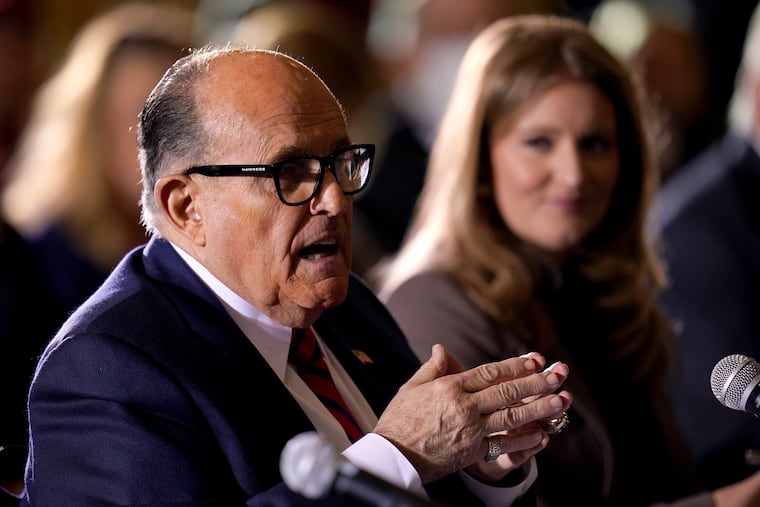President Trump invited Pa. lawmakers to the White House. Then everyone went silent.
President Donald Trump summoned state lawmakers to the White House to talk about the election, but those who went weren't talking about it later.

President Donald Trump on Wednesday summoned Republican members of the Pennsylvania legislature to the White House after a GOP hearing in Gettysburg in which Trump phoned in to reassert his false claim that he “won Pennsylvania by a lot.”
But on Thursday, no one wanted to talk about the meeting.
The White House did not issue a public statement about the visit, and lawmakers who made the trip to Washington were silent.
President-elect Joe Biden won Pennsylvania and its 20 electoral votes by 80,555 votes, according to the results Secretary of State Kathy Boockvar certified Tuesday. The former vice president is ahead in the national popular vote by about six million votes. Election officials across the country have found no evidence of widespread fraud, as Trump has alleged.
Even with the Biden transition underway, the president is pressing ahead with increasingly desperate attempts to invalidate the election or raise doubt about Biden’s legitimacy as the incoming president.
On Wednesday, Trump lawyer Rudy Giuliani brought his baseless case to a hearing convened in Gettysburg by the all-Republican state Senate Majority Policy Committee.
Giuliani alleged that the election had been stolen and covered up with the assistance of “Big Tech,” the news media, and the courts. Trump called in to the hearing, speaking through attorney Jenna Ellis’ cell phone held up to the microphone, and falsely claimed: “This election was rigged, and we can’t let that happen. This election has to be turned around because we won Pennsylvania by a lot and we won all these swing states by a lot.”
Afterward, several Republican lawmakers from Pennsylvania were invited to the White House to meet with Trump. CNN, citing two sources, said the meeting was expected to take place in the West Wing. The legislature’s Republican leaders — the GOP has a majority in both chambers — were notably not among the attendees, according to the leaders and their spokespeople.
It’s unclear what Trump was hoping to accomplish by meeting with Pennsylvania lawmakers, especially without the leadership present. It was the second time in as many weeks that the president had brought Republican state lawmakers to the White House regarding the election; he did the same with Michigan legislators Nov. 20.
Pennsylvania House Speaker Bryan Cutler (R., Lancaster) didn’t go to the White House meeting Wednesday. Nor did House Majority Leader Kerry Benninghoff (R., Centre), incoming Senate Majority Leader Kim Ward (R., Westmoreland), or current Senate Majority Leader and incoming Senate President Pro Tempore Jake Corman (R., Centre).
Benninghoff and Corman have repeatedly said the legislature will not be interfering with the outcome of the presidential election, and their spokespeople confirmed that on Wednesday.
The White House did not respond to requests for comment about the meeting or who attended. In 2017, the Trump administration stopped making public the names of White House visitors, citing what a spokesperson called “grave national security risks and privacy concerns of the hundreds of thousands of visitors annually.”
State Sen. Doug Mastriano (R., Franklin), one of the Senate’s most conservative members, was among the lawmakers who went to the White House, legislative sources said. Mastriano played a key role in organizing the Senate Majority Policy Committee hearing in Gettysburg. He did not return a phone call seeking comment.
» READ MORE: Jake Corman, the Pa. Senate Republican leader, on the election, voter fraud claims, and who won the presidency
Trump’s session last week with Republican lawmakers from Michigan was attended by legislative leaders. The president’s allies had been pushing to have the state legislature overturn Biden’s victory and award the state’s 16 electoral votes to Trump. After their meeting with Trump, the GOP leaders rebuffed that notion.
“We have not yet been made aware of any information that would change the outcome of the election in Michigan and as legislative leaders, we will follow the law and follow the normal process regarding Michigan’s electors, just as we have said throughout this election,” Senate Majority Leader Mike Shirkey and House Speaker Lee Chatfield said in a joint statement.
» READ MORE: Trump says he will leave White House if electoral college votes for Biden
In Pennsylvania, State Sen. David Argall (R., Schuylkill), the majority committee’s chair, did not respond Thursday to a request for comment. The 13 other members of the committee, as well as state representatives who joined in the Gettysburg hearing, did not respond to requests for comment, or said they did not go to Washington, or couldn’t be reached Thursday.
Despite Monday’s certification of Pennsylvania’s election results, U.S. Rep. Mike Kelly (R., Butler), a Trump supporter, is asking the Commonwealth Court to throw out the election results and appoint the Republican-controlled legislature to choose the victor in the state. That case is pending.
Kelly is challenging the legality of the state legislature’s vote to expand mail-in voting this year. The measure to do that passed with wide bipartisan support. Only one Republican voted against it in the House and none were opposed in the Senate.
So far, Trump has lost 11 of the 12 Pennsylvania lawsuits he has filed in state and federal courts since Election Day, and those challenges do not allege voter fraud or provide any evidence of it.
Staff writer Jonathan Lai contributed to this article.